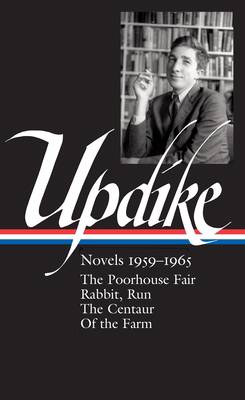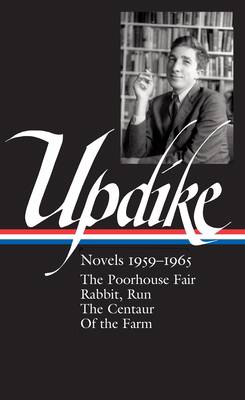
- Afhalen na 1 uur in een winkel met voorraad
- Gratis thuislevering in België vanaf € 30
- Ruim aanbod met 7 miljoen producten
- Afhalen na 1 uur in een winkel met voorraad
- Gratis thuislevering in België vanaf € 30
- Ruim aanbod met 7 miljoen producten
Zoeken
John Updike: Novels 1959-1965 (Loa #311)
The Poorhouse Fair / Rabbit, Run / The Centaur / Of the Farm
John Updike
€ 59,95
+ 119 punten
Omschrijving
Library of America launches its definitive multi-volume edition of John Updike's novels with the four early works that signaled the arrival of one of the most gifted young novelists of the 1960s. John Updike had already made a name as a contributor of stories and poems to The New Yorker when, in January 1959, at the age of twenty-six, he published his first novel, The Poorhouse Fair, launching one of the most extraordinary literary careers in American letters. Now, Library of America inaugurates a multi-volume edition of Updike's novels with this volume gathering his first four novels, including the landmark Rabbit, Run, chosen in 2010 by TIME Magazine one of the best 100 novels published in English since 1923. Set in the near future of 1978, The Poorhouse Fair stages a conflict between John Hook, a rebellious ninety-four-year-old former schoolteacher now a resident of a rural poorhouse, and young Mr. Conner, the utilitarian humanist who runs the facility, as an allegory of resistance in a world of systems and efficiencies. Updike's legendary rejoinder to Jack Kerouac's On the Road, Rabbit, Run (1960) introduces us to the author's most enduring protagonist, Harry "Rabbit" Angstrom, a onetime high-school basketball star who, on an impulse, deserts his wife and son, with tragic consequences. The Centaur, a comic-tragic father-son novel that mixes memory and myth, won the National Book Award for Fiction in 1964. The novella Of the Farm (1965) is one of Updike's loveliest performances, a kind of chamber music for four voices set during a single memorable weekend. LIBRARY OF AMERICA is an independent nonprofit cultural organization founded in 1979 to preserve our nation's literary heritage by publishing, and keeping permanently in print, America's best and most significant writing. The Library of America series includes more than 300 volumes to date, authoritative editions that average 1,000 pages in length, feature cloth covers, sewn bindings, and ribbon markers, and are printed on premium acid-free paper that will last for centuries.
Specificaties
Betrokkenen
- Auteur(s):
- Uitgeverij:
Inhoud
- Aantal bladzijden:
- 850
- Taal:
- Engels
- Reeks:
- Reeksnummer:
- nr. 3
Eigenschappen
- Productcode (EAN):
- 9781598535815
- Verschijningsdatum:
- 20/11/2018
- Uitvoering:
- Hardcover
- Formaat:
- Genaaid
- Afmetingen:
- 135 mm x 203 mm
- Gewicht:
- 725 g

Alleen bij Standaard Boekhandel
+ 119 punten op je klantenkaart van Standaard Boekhandel
Beoordelingen
We publiceren alleen reviews die voldoen aan de voorwaarden voor reviews. Bekijk onze voorwaarden voor reviews.











